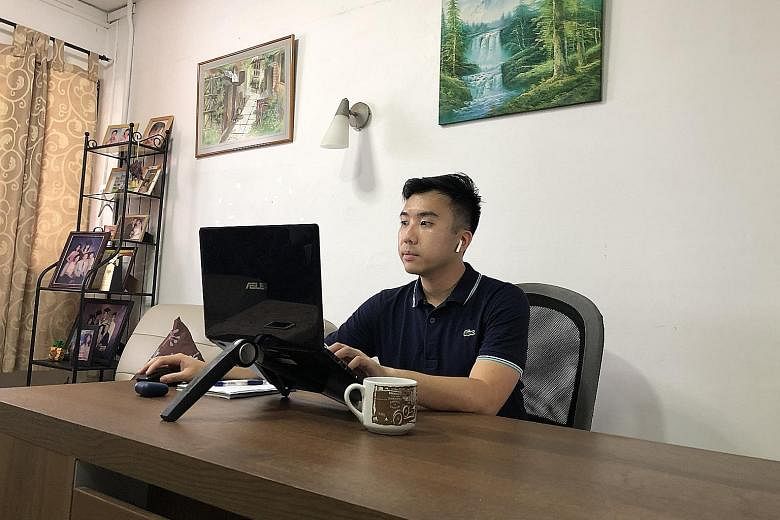Covid-19 may have battered economies and crippled businesses worldwide. But for a fortunate few companies, business is booming, with rising profits, greater growth prospects and more customers than ever.
Video conferencing software companies like Zoom have seen their share price skyrocket.
Video streaming giant Netflix has gained nearly 16 million new subscribers. Freezers are selling like hot cakes. Supermarket cash registers ring round the clock.
Closer to home, the family with a 57 per cent stake in supermarket chain Sheng Siong Group has reportedly joined the ranks of billionaires.
Other companies are also seeing heightened demand for products, services and expertise that help people work, study and play at home.
LG Electronics Singapore, for example, last month saw sales of its computer monitors swell by 50 per cent from the previous month. Sales of its laptops more than doubled, fuelled by more companies implementing work-from-home arrangements.
Early this month, it saw a further surge when schools rolled out home-based learning.
Its television sets also had a 46 per cent bump in sales last month, compared with the previous month.
Mr Lee Changha, LG Electronics Singapore's head of product management for home entertainment, says: "During this circuit breaker period, more people are staying home and looking for in-home entertainment options.
"People are also spending more time gaming and watching movies at home, so they see a need to upgrade to a better television set."
Some payment solutions firms such as hoolah are also seeing a spike in demand.
The payment start-up, which allows consumers to get the things they need today and pay later through three interest-free instalments, saw its business grow by more than 25 per cent month on month from January to last month.
Mr Arvin Singh, 33, hoolah's co-founder and chief operating officer, says: "Due to the Covid-19 outbreak and the likelihood of an upcoming recession, people are more reluctant to get the things they want.
"It is here that hoolah helps consumers get what they want or need today while spending responsibly."
For example, Singaporean Dana Safia bought two Flabber bean bag sofas from online furniture store HipVanlast month. Using hoolah, she split the sofas' total cost of $480 into three monthly payments of $160.
The 33-year-old operations manager says: "Breaking the payments down helps with my monthly budget. Now, with the pandemic affecting the world's economy, it is especially helpful."
Ms Venice Ng, 28, head of marketing at HipVan, notes that since the coronavirus outbreak in late January, the company has seen 20 per cent more people choosing to pay using instalment-based options.
"During these uncertain times, it is great that more payment options are made available to our customers, so they have peace of mind that they can manage their cash flow comfortably," she says.
Other tech companies have seen a boom in business because of efforts to minimise the spread of Covid-19.
Esri Singapore, which provides smart mapping technology that helps users better understand spatial relationships, has seen extensive use of its technology by front-line agencies to support tasks such as contact tracing and disease surveillance.
Its technology is also being used in the National Parks Board's Safe Distance @ Parks portal (safedist parks.nparks.gov.sg), which allows the public to check the visitorship of major parks and green spaces, as well as in the Urban Redevelopment Authority's Space Out website (www.spaceout.gov.sg), which allows the public to check how crowded malls, supermarkets and post offices are.
Esri Singapore's chief executive officer Thomas Pramotedham, 44, notes that more companies are also embracing geospatial technology to help them monitor safety, improve business continuity and meet work demands with a reduced workforce.
"We have received requests across multiple sectors, such as construction and essential services, to deploy applications that can help a workforce facing constraints to operate effectively and safely."
Now that working from home is the default for most organisations, companies that facilitate such arrangements are also seeing an upswing in business.
One such is Everise Holdings, a Singapore-headquartered business process outsourcing company.
It has a home-based agent programme offering employment positions such as customer service representatives and technical support representatives to people in the United States, Ireland, Guatemala, Malaysia, the Philippines and Singapore.
It has seen snowballing demand from companies that want to continue operating while abiding by work-from-home regulations.
It is seeing a mushrooming of job applicants, from those who have been freshly laid off or are seeking jobs that allow them to work remotely.
Revenue from the programme this year is projected to be 1.5 times that of last year's, and it expects to grow its headcount by 50 per cent over the same period.
In the last week of last month, a leading same-day grocery delivery start-up signed up, asking Everise to employ thousands of at-home workers to support customer queries about their orders over voice, chat and e-mail.
By the end of this year, Everise aims to employ at least 500 Singaporeans who work from home, up from its current nine.
Mr Sudhir Agarwal, 45, global chief executive officer of Everise, says: "With the prevalence of social distancing and a looming recession, our work-from-home programme is an attractive option for people to earn an income at this time.
"And with many offices ordered to close, businesses that want to continue operating need to access talent remotely, which is where we come in."
One of Everise's employees is Singaporean Kwan Fey Mun, 31, a manager in the chief executive's office. He joined the company in December last year and has been working from home since last month.
He says: "I feel very fortunate to be working for Everise right now. I don't take it for granted that the company's business is actually growing during this period, when many other businesses are facing challenges."


